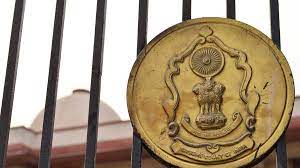(A) All-India Services (Performance Appraisal Report) Rules, 2007, Rule 5(1), Schedule 2 of the Guidelines issued under the PAR Rules – Service Law – Performance Appraisal Report – Expunction of the opinion of the Accepting Authority – Challenge as to – Respondent No. 1 came to be appraised by the Reporting Authority i.e., the Chief Secretary and, accordingly came to be awarded, inter alia, an overall grade of 8.22 – Subsequently, a divergent view was taken by the Reviewing Authority i.e., the Health Minister who upgraded Respondent No. 1’s overall grade to ‘9.92’ – Accepting Authority i.e., the Chief Minister rejected the aforesaid and downgraded Respondent No. 1’s overall grade to ‘9’ in the PAR – Tribunal upheld the overall grade given by Chief Minister but High Court set aside the same and upheld the grade given by Reviewing Authority –Though, accepting Authority populated its remarks and awarded an overall grade on 31.12.2017 i.e., after a delay of 184 in contravention of the timelines prescribed under the Schedule in view of Rule 5(1) of the PAR Rules yet a contravention of the said timelines, neither render the underlying PAR invalid, nor would be met with any identified immediate consequence – Admittedly, the Accepting Authority has met the timelines prescribed under Rule 5(1) of the PAR Rules and accordingly, in view of the compliance with mandatory timelines prescribed under the PAR Rules find no reason to expunge the remarks and overall grades awarded to Respondent No. 1 by the Accepting Authority on the PAR on account of a contravention of the timelines prescribed under the Schedule. (Para 16, 19 and 21)
(B) Constitution of India, Article 226 – All-India Services (Performance Appraisal Report) Rules, 2007, Rule 9(7B) – Service Law – Performance Appraisal Report – Expunction of the opinion of the Accepting Authority – Challenge as to –Writ jurisdiction –Whether the High Court ought to have interfered with the CAT Order in exercise of its jurisdiction under Article 226 of the Constitution of India? –Held that the process of evaluation of an IAS officer, more so a senior IAS officer entails a depth of expertise, rigorous and robust understanding of the evaluation matrix coupled with nuanced understanding of the proficiency required to be at the forefront of the bureaucracy – This administrative oversight ought to have been left to the executive on account of it possessing the requisite expertise and mandate for the said task – High Court entered into a specialised domain i.e., evaluating the competency of an IAS officer by way of contrasting and comparing the remarks and overall grades awarded to Respondent No. 1 by (i) the Reporting Authority; (ii) the Reviewing Authority; and (iii) the Accepting Authority, without the requisite domain expertise and administrative experience to conduct such an evaluation – High Court ought not to have ventured into the said domain particularly when the Accepting Authority is yet to pronounce its decision qua the Underlying Representation – Division Bench of the High Court erred in law – Judgement of the Division Bench of the High Court liable to be set aside – Accepting Authority is yet to take a decision on the Underlying Representation – Accepting Authority directed to take a decision on the Underlying Representation under Rule 9(7B) of the PAR Rules within a period of 60 (sixty) days from the date of pronouncement of this Judgement – Thereafter, Respondent No. 1 is granted liberty to take recourse to remedies as may be available under law. (Para 27 to 29)
SUPREME COURT OF INDIA
2024 STPL(Web) 157 SC
[2024 INSC 190]
State Of Haryana Vs. Ashok Khemka & Anr.
Civil Appeal No(S). 3959 of 2024 [Arising out of SLP (Civil) No(s). 13972 of 2019]-Decided on 11-03-2024
https://stpllaw.in/wp-content/uploads/2024/04/2024-STPLWeb-157-SC.pdf







